Computing: Direction of Research and
Development for Thailand
Prabhas Chongstitvatana
Panutpat Nanthanavoot
Sunisa Rimcharoen
Department of computer engineering
Chulalongkorn university
Prabhas cv
Prabhas
publication list
Talk to students of computer and information technology at Radchapat,
Nakorn Pathom. 18 June 2005.
Outline
Overview
- Information technology, the always changing field
- From technology industries to service industries
- Integration to create new business
- e-business
case study: change at IBM
-- IBM has changed through 1990-2000 from computer manufacturer to
solution provider
-- in 2002 IBM buy KPMG the accounting service
-- IT outsourcing, Deutch bank to IBM
-- Thai farmer bank to IBM for all IT services, amouting 10,000 million
baths for 10 years in 2003.
-- In March 2005, IBM sold off the entire PC section to Lenovo, a giant
Chinese company, a 1.2 billion us dollars deal.
-- IBM's earning from software is larger than Microsoft
Research in Thailand
from National Research Council of Thailand (NRCT)
Comparative study of Thai research with the World 2001 (2544)
The spending on research and development versus Gross Domestic Product
(GDP) in 2001 is 0.22%
This figure is lower than many countries in Asia, USA and Europe.
For example:
Sweden, Finland, Japan 3%
South Korea, USA, Taiwan, Singapore 2%
Canada, UK, China 1%
Hongkong 0.55%
Malaysia 0.48%
figure research
spending
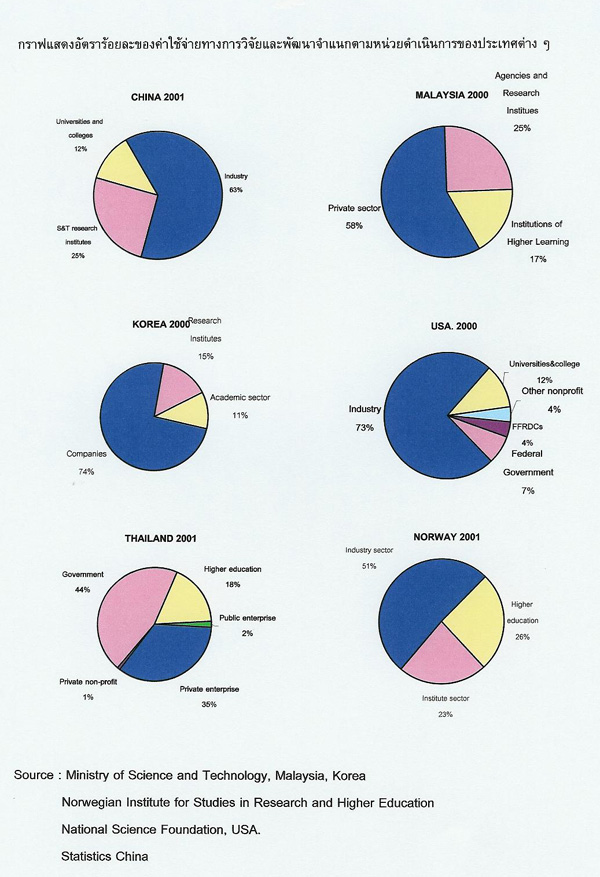
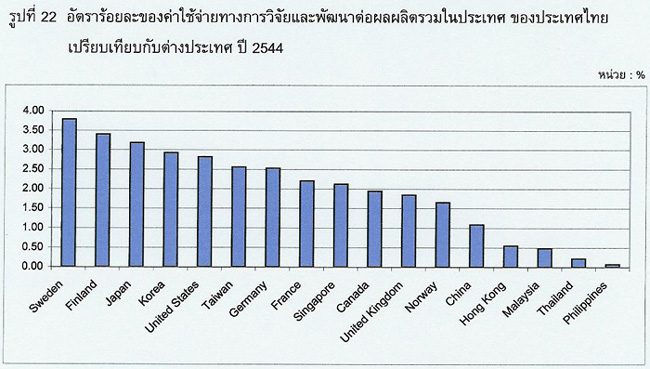
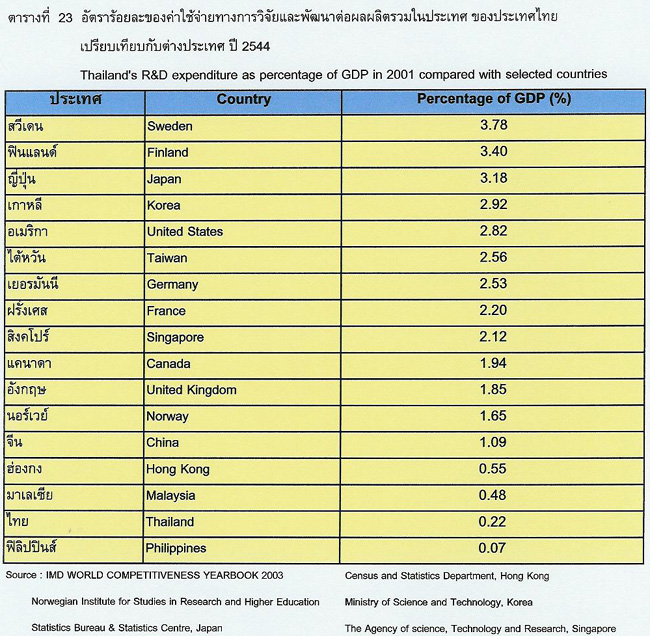
The full-time equivalent (FTE) of personel in research in Thailand is
3.9 per 10,000 citizen.
This figure is lower than many countries in Asia, USA, and Europe
Sweden, Finland, Japan 70-100
Taiwan, Singapore, Canada 40-60
South Korea, UK 15-30
China 7.5
Malaysia 4.3
Figure researh
personel
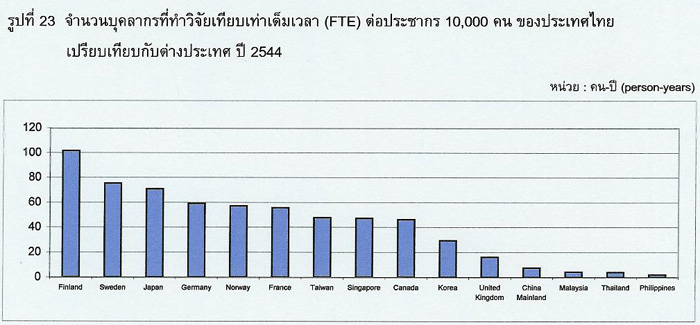
The total government budget for research in Thailand during 2001-2003
is as follows:
2001 8,780 million baths
2002 9,722 million baths
2003 10,218 million baths
Figure budget-research
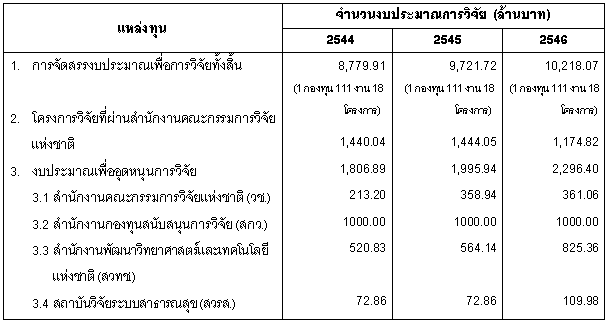
The budget is partly managed through 4 institutes:
- National council of research
- Thailand research fund
- Thailand institute for development of science and technology
- Research institute for health
National Policy and
Research Direction Plan 6 (2001-2005)
(2545-2549)
NRCT annual report 2004 (2547)
- Aim to achieve the research's target and realise the result at
the same time, support the objective and strategy of the national
economic and social development plan 9 2001-2005 (2545-2549)
- Emphasise the research which Thailand has potential and advantage
in the competition.
- Emphasise the research management and evaluation to achieve an
efficiency.
- Emphasise dynamic policy and direction of research which can
adapt to the actual situation.
- Emphasise national research programs which are aimed to have a
short term applications.
- Emphasise applied research to solve national problems for both
short and long term.
- Emphasise basic research to create new knowledge towards the
world's trend to knowledge based society.
- The ratio of supporting for national research programs-applied
research-basic research is 50:20:30.
- Aim to develop researchers, research networks, research
invesment, building the research teams and research systems in all
research activities.
- Aim to create synergy between government, business, and Thai
citizen to determine policy and direction of research and the
application of the research's results.
Conclusion for overview of research in Thailand
We need to develop more research personel if we are to be competitive
with our neibouring nations. The research budget should also be
increased. It is important to find a strategy to channel research
budget from the private sector. National research budget alone
cannot sustain Thailand to be competitive.
Research in Computing
in Thailand
from "Thailand: vision towards a knowledge based society"
Policy of information technology for Thailand 2000-2010
by National Electronics, Communication Technology Centre, ISBN
974-229-226-4, 2002.
<2005-2-25-235789-IT2001.pdf>
IT industry is defined as:
- Hardware industry
- Software industry
- Telecommunication services industry
For hardware, there are four target industries:
- Wafer fabrication
- IC design
- Optic fiber
- Telecommunication switch
Software industry
The value of application software in Thailand in 2000 is 4.5 billion
baths and over 70% is imported. The export value for software of
the same year is around 1 billion baths. The trend of value of
software is increasing at the rate of 33% per year.
We are not going to discuss the telecommunication services industry.
NECTEC has laid down four policies:
- Support and develop the manufacturer of IT goods to produce and
integrate components and products in the country with the lower cost
than the imported goods.
- Develop Thai software industry to achieve international
standard to strengten Thai software
- Develop basic infrastructure for telecommunication to support
government policy of equal IT access to the people. Supporting
the consumption of local goods.
- Government, Education institutes and industry must collaborate
to develop curriculum in information technology including training to
produce scholars and professionals in IT and to increase the skill of
IT workers.
Software Industry Promotion Agency (SIPA)
<www.sipa.or.th>
SIPA was founded in 2002 as a non-profit public organisation. Its
mission is to
-- Promote the software industry by pushing on the skill practice
enhancement.
-- Promote the software industry by pushing on the employment
increasing.
-- Promote the software industry by stimulating the varying channels of
marketing both in domestic and international.
<SIPA annual report 2004
http://www.sipa.or.th/en/index.php?option=content&task=view&id=47>
Presently (June 2005), SIPA has many projects running, for example:
- Java development cluster, aims to develop more Java certified
programmers
- Digital contents co-production
- Collaboration of SIPA and BOI (board of investment)
- Animation projects, provide training and curriculum development
with
educational institutes to produce personels.
- ICT city, prepare Thai society for knowledge based society in the
future.
- Large enterprise, promote the use of wireless broadband
- Software for SMEs, promote the use of ICT to increase
productivity of
SMEs
- Techno tourism, attract investors and software specialists to
come to
Thailand to conduct software business.
SIPA is an active promoter of open source software.
Software Park
Thailand
<www.swpark.or.th>
Software Park Thailand, a government agency under National
Science and Technology Development Agency was established to stimulate
the development of Thai software industry, push it towards a
sustainable level and provide it the means to survive in rapidly
changing global digital economy. Its mission includes:
-- offer state-of-the-art infrastructures and investor-friendly
environment that nurture young software entrepreneurs during the
start-up period;
-- broaden knowledge and enhance skills of Thai IT professionals
through various kind of educational activities and;
-- establish a business-to-business exchange from both national and
international basis
Software park has incubation centres to help programmers to start their
own business.
Conclusion
NECTEC, Software park and SIPA are government inititatives to sustain
and develop Thai electronics and computers industry. There are
clear and definite policies to guide research and development of IT
activities in Thailand.
Nature of Software
Software industry is moving away from CD-based software business model
towards web-based. The internet enables fast connection to a
large number of potential customers. With frequent and easy
updates to software, the software market is expanding at a faster rate
than ever. Business model for software is changing, for example
"application service provider" becomes a new way to sell
software. XML becomes a standard for data interchange.
To realise "software factory" software creation must be able to
scale-up. This can be achieved through raising the level of
abstraction, from "objects" to "components" and "interface"
level. To industrialised software creation, there must be a
standard way to compose many parts of software from different sources.
<links to
software architecture resource cites>
Software is very different kind of goods. Most products will have
a large part of effort in production whereas software effort is mostly
in development. Production is at a much lower cost than other
kind of goods. Wear and tear associated with normal goods whereas
for software the concern is in correctness.
Software can have both economy of scale and economy of scope. In
economy of scale, the larger volume of production will bring the cost
down. In economy of scope, instead of having one kind of software
for a large number of customers, there is fewer customer which need
different kind of software, however, those software have many parts in
common. This fact enables one part to be used in many
end-products.
Examples of research
work in Thailand
Hardware
<presentation>
Developing a circuit for a processor that enable the executable code to
be compressed and execute in real-time.
motivation for chip
design
To increase the upstream development so as to balance the benefit in
value-chain. Chip design also poses many interesting problems and
offers many opportunity to develop valuable special skills.
Benefit of this work
Reduce the cost and size of embedded processor chip. This chip is
suitable for small embedded systems. Embeded systems are becoming
the mainstream market and are expanding very rapidly. This work
also supports the development of chip fabrication in Thailand.
(TMEC is located in Chacherngsao).
<http://www.tidi.nectec.or.th/thaichip/history.htm>
Embeded system is an active area for a near term global business
opportunity. Link to Thai Embeded Systems Association, the
organisation to
promote embeded systems. <www.tesa.or.th>
Software
Developing an algorithm to solve symbolic regression problems
<presentation>
<fig 1 forecasting the bath/dollar exchange rate>
<fig 2 the error rate of testing data>
<fig 3 forecasting the SET index>
<fig 4 the error rate of SET index testing data>
examples of foreign exchange forecasting and SET index forecasting for
Thai market
motivation
To find a better formula for forcasting.
Benefit of this work
The proposed method generates formulas for forcasting that have lower
error than a normal regression method. The method is based on
probabilistic search which employed modification operators to
generate-and-test new formulas. It also posses the ability to
discover new relationships in the data.
Conclusion
Thailand needs to develop her capacity for IT industry. The urgent need
is to develop more personel and trains the present IT personel to have
uptodate skill for the changing IT industry. This can be
accomplished not by the government alone but educational institutes and
IT industry must work together. We need to be more flexible and
yield to change. It is a challenge to find a suitable focus and
strategy to channel the budget and effort in a novel way to create
knowlegde workers for the near future.
END
last update 21 June 2005




